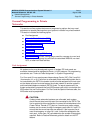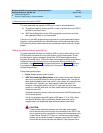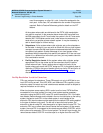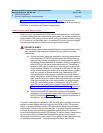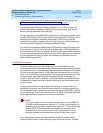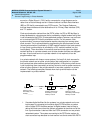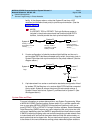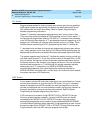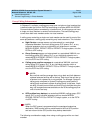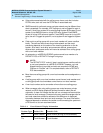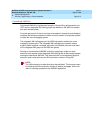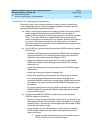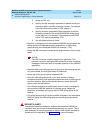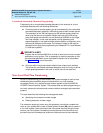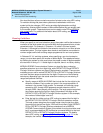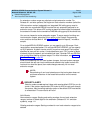
MERLIN LEGEND Communications System Release 6.1
Network Reference
555-661-150
Issue 1
August 1998
Network Management
Page 5-10General Programming in Private Networks
5
Group Calling Enhancement 5
In Release 6.1 and later, a calling group may have a
single
non-local member that
is defined under the Uniform Dial Plan as existing on another MERLIN LEGEND
Communications System connected by a tandem trunk. A calling group can have
a single non-local member or several local extensions. The same calling group
cannot
have both local members and a non-local member.
A calling group containing a single non-local member can be used for most of the
same purposes as a calling group containing only local extensions. This includes:
■ Night Service coverage across a private network to a centralized
Automated Attendant, non-local calling group, QCC queue, DLC, or any
individual extension such as a night bell or an extension on a remote
MERLIN LEGEND, DEFINITY ECS or DEFINITY Prologix system, or to the
PSTN via UDP routing.
■ Group Coverage across a private network to a centralized VMS/AA, non-
local calling group, QCC queue, DLC, or any individual extension on a
remote MERLIN LEGEND, DEFINITY ECS or DEFINITY Prologix system,
or to the PSTN via UDP routing.
■ Calling group overflow coverage to a centralized VMS/AA, non-local
calling group, QCC queue, DLC, or any individual extension within a
remote MERLIN LEGEND, DEFINITY ECS or DEFINITY Prologix system,
or to the PSTN via UDP routing.
NOTE:
Be sure that overflow coverage does not go back and forth between
systems because facilities will be tied up. Each leg of the call ties up
a tandem trunk; release link is not provided. For example: System A
calling group overflows to System B calling group and System B
calling group overflows to system A calling group. In this case, if both
are busy, the calls bounce back and forth tying up facilities along the
way until an agent becomes available on one of the calling groups or
until all trunks are busy.
■ QCC position busy backup to a centralized VMS/AA, calling group, QCC
queue, DLC, or any individual extension within a remote MERLIN
LEGEND, DEFINITY ECS or DEFINITY Prologix system, or to the PSTN
via UDP routing.
NOTE:
When the QCC queue is programmed as the unassigned extensions
destination, VMS transfer returns are delivered to the first QCC position
and are not sent to the QCC position busy backup destination.
The following considerations apply when using a calling group with a non-local
member:



